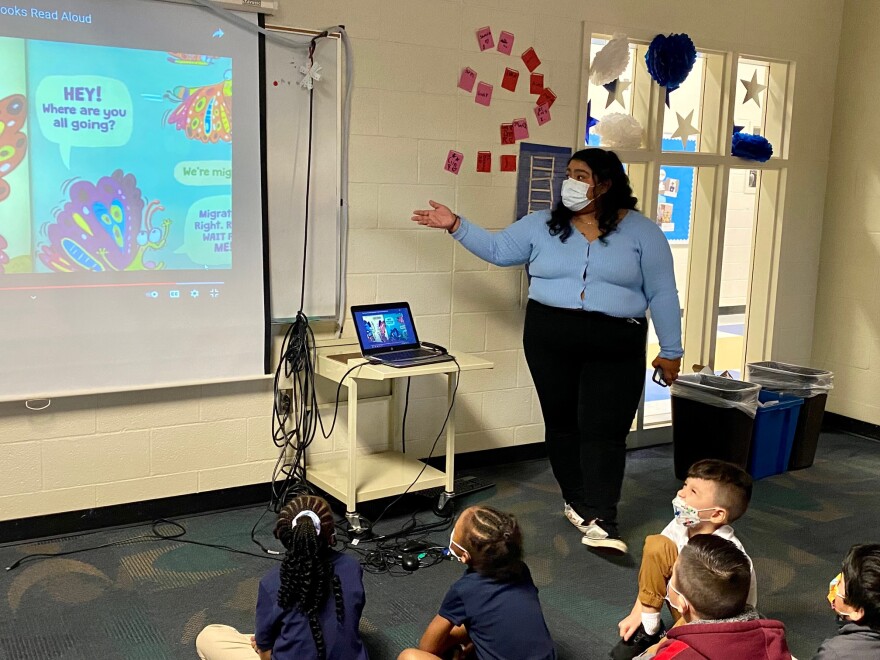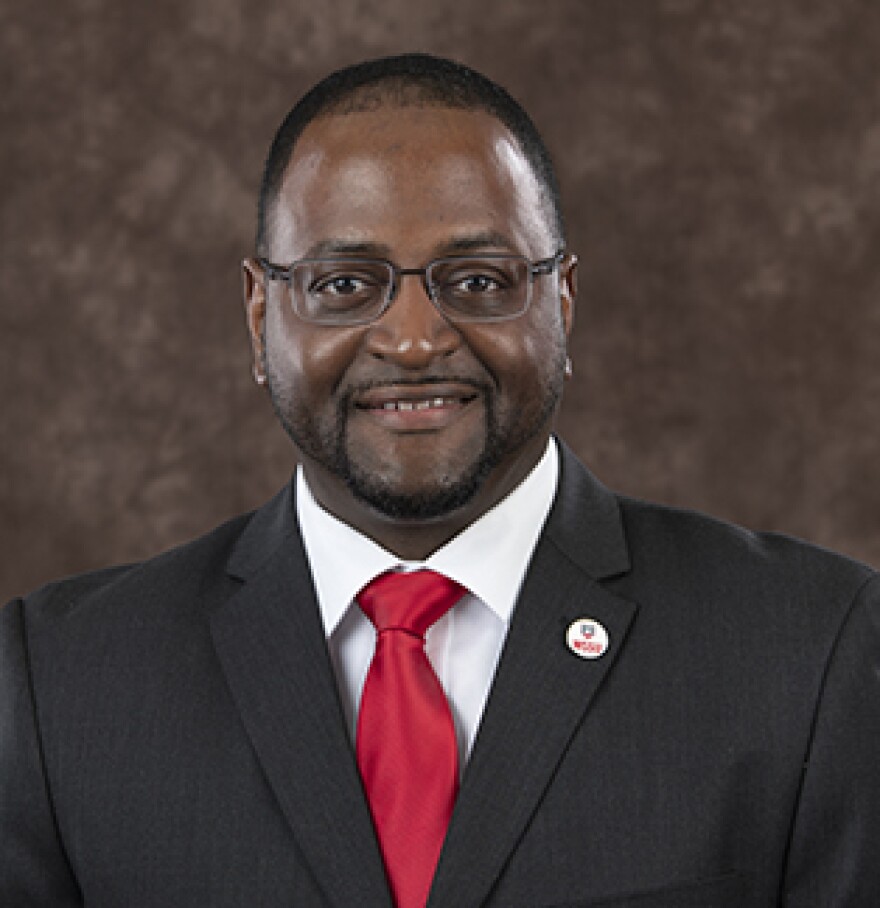As teacher shortages make headlines, a small public high school on the campus of UNC Charlotte is preparing teens to enter the profession.
It’s the only school of its kind in North Carolina, and some say it could be a model for getting more teachers of color into classrooms.
Take Landy Solorzano, an 18-year-old who's both a Charlotte-Mecklenburg Schools student and employee.
She looked like just another teacher as she worked with 14 kindergarteners in the media center at Hickory Grove Elementary School late last month. She kept the class under control, helped students learn their letters and numbers, and reinforced basic lessons about sharing and kindness.

Solorzano was among the first ninth-graders who entered Charlotte Teacher Early College High when it was created in 2017. She quickly worked through her high school requirements and earned enough college credits to get hired as a teacher assistant this summer.
The early college model means she can stay in high school an extra year, continuing to take college courses at no charge while she develops work experience.
Solorzano is also Latina. Leaders of CMS and the state say they’re eager to hire more Spanish-speaking and Latino educators to serve a growing segment of the community.
"There’s such a lack of color, you could say, in CMS," Solorzano said.
Sixty-three percent of CMS teachers are white, while only 25% of students are. In contrast, 28.5% of CMS students are classified as Hispanic, and only 2% of teachers are Latino.
Solorzano, the daughter of educators who are immigrants from Latin America, says she wants to inspire other students of color.
"I think it’s super important," she said. "And I think that’s one of my main goals being a teacher, is being able to show that it’s OK, like things they do are OK, their culture is OK."
A special kind of early college school
North Carolina has 113 public high schools located on university and community college campuses. They’re all designed to provide an introduction to college life and a way to accumulate credits while working toward a high school diploma.
But the Charlotte Teacher Early College High — or CTEC — is the only one specifically developing potential teachers.
CTEC has about 200 students this year. Three-quarters of CMS students are non-white. At CTEC, just over 85% are students of color, including 55% who are Black and 24% who are Latino.

Anthony Graham, provost at Winston-Salem State University, chaired a state task force focused on getting more educators of color into North Carolina’s classrooms. One of its recommendations was to create more pathways to introduce K-12 students to the profession.
Too often, Graham says, students of color aren't interested in teaching because they don't see teachers who look like them, creating a cycle of underrepresentation.
"So this school is one of those disruptive forces, if you will, that helps us think differently about how we introduce young people to the teaching profession at a much earlier age than we normally would," Graham said.
Graham says North Carolina's network of college-based high schools is admirable, but too often focuses on careers in engineering and science.
"I would like to see other universities, other communities, other school districts take a look at what this early college is doing and begin to scale that effort," he said.
Graham says the task force report focused broadly on teachers of color. In the future, he suggests, leaders need to explicitly highlight ways to recruit Latino and language-minority educators.
Teaching isn't for everyone
CTEC shares space on the UNCC campus with another CMS high school preparing students for engineering. It's too early to say how effective CTEC will be in producing teachers, according to Will Leach, who's principal of both schools.
Students start doing job-shadowing and classroom observations around their junior year.
"And some of them saw that, 'Yes, absolutely, I want to be a teacher.' And some of them saw, 'I’m not so sure I want to be a teacher,' " Leach said.
Bear in mind that students apply during the CMS choice lottery when they’re 13 or 14 years old. And the pandemic interrupted fieldwork when schools went remote, then limited visitors as in-person classes resumed.

For Tylan Deams, a 12th-grader at CTEC, this year brought her first chance to work with young students.
"It’s like a rush. I always love it," she said. "I went to a classroom with a bunch of fourth-graders and it was probably the best thing I’ve done in months."
The children asked her for help with math. She says she remembered a song she'd learned as a child to help memorize multiplication tables.
"I was singing songs and I was dancing around the classroom," she said. "They learn from, like, someone engaging with them, talking, dancing. That’s their thing."
Deams says her parents worry about her going into a field with relatively low pay. It helps that she’ll leave high school with about half of her college credits earned at no cost.
This year's graduates are crucial
The first group who started as ninth-graders in 2017 are a year ahead of Deams. Leach says a few went back to regular high schools. Seven graduated last year, after the standard four years of high school.

Thirty-two are expected to graduate this spring, after an extra year. Leach says about a dozen say they won’t be teachers. About the same number are undecided.
"I think we’re at a critical crossroads," he said. "This group of students, we’ve got to do a lot of exit interviews with them over the next few weeks and months to get their opinions about what could we have done differently? What could have enticed you more to stay?"
Leach says it’s a victory to send graduates off to college with credits and confidence, even if they don’t major in education. But in a system that has seen retirements surge and the supply of new teachers taper off, students like Tylan Deams and Landy Solorzano offer added hope.
The number of education degrees awarded by the UNC system began declining a decade ago and began ticking back up a couple of years ago. Still, 20% fewer teaching degrees were awarded in 2021 than in 2011.
Real-life lessons in being a teacher
Solorzano was hired as a teacher assistant in east Charlotte’s Hickory Grove Elementary in August. When the school’s media assistant left, she was tapped to lead the sessions where all grade levels cycle through the library while their classroom teachers have planning time.
A room full of kindergarteners can get noisy, but Solorzano never seems upset or flustered.

"I started a thing with my kindergarten kids where I tell them that it hurts my feelings and they are really receptive with that," she said. "And it also gives them the understanding that some things are not OK, and when they feel hurt to say it."
A couple of her kindergarteners need a lot of attention to help them stay focused. Recently one of those children had a bad day despite Miss S’s efforts, so she told him he wouldn’t get the treat she’d brought for the class.
"So he threw a chair," Solorzano recalled.
In CMS and across the country, there’s concern that behavior like this too often leads to students of color being labeled as bad kids and set on a path to failure. Solorzano says instead of yelling at the child, she told him, "Hey, it hurt my feelings that you’re throwing my things because I work hard to make sure that my room is clean."
The next day, at the end of his time in the media center, Miss S handed him the lollipop he’d had to forgo the day before.
"I had a better day! I did good!" he exclaimed.
And when his kindergarten teacher came to pick up the class, he was quick to share his victory.
"I didn’t throw no chairs!" he told her proudly. "But … only crayons."
Those small victories make Solorzano feel like she might become the kind of teacher who makes a difference.
"One teacher can change a child’s life," she said. "So I think that’s really why I wanted to teach."
Her colleagues see her potential. Last week they chose her as Hickory Grove’s teacher assistant of the year.




